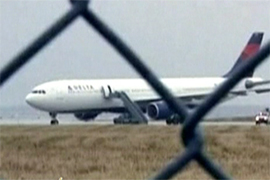Obama links bomb plot to al-Qaeda
US president accuses group’s affiliate of backing Christmas Day bid to blow up jet.

Days after the attack, al-Qaeda in the Arabian Peninsula had claimed it was behind the attempt.
Obama vowed to hold the group to account for the attack, saying the US was at war with its “far-reaching network of violence and hatred”.
Umar Farouk Abdulmutallab, a 23-year-old Nigerian, is accused of trying to blow up a Northwest Airlines flight from Amsterdam to Detroit using explosives concealed in his underpants. He was overpowered by other passengers.
In his address, Obama said he had received preliminary results of reviews he ordered into air travel screening procedures and a “terrorist watchlist system”, with final results expected in the next few days.
| in depth | |||||||
|
He used much of his address to outline his administration’s efforts to keep US citizens safe -including withdrawing troops from Iraq, boosting troop levels in Afghanistan and boosting ties with Yemen, where Abdulmutallab had spent time.
Obama has summoned his intelligence chiefs to a meeting at the White House next week to discuss how to prevent a repeat of the attempted bombing.
In another development, Dennis Blair, the US director of national intelligence, has cautioned his staff that al-Qaeda attacks are sure to get more “cunning”.
“Al-Qaeda and its affiliate organisations, as well as individual suicide terrorists, have observed our defences and are designing future attacks to circumvent them,” he said.
“These attacks will be even harder to uncover, interpret, and stop.”
US-Yemen talks
The Reuters news agency reported an unnamed US official as saying that at least four months ago, the US National Security Agency had intercepted communications between al-Qaeda leaders in Yemen discussing the possibility of using a “Nigerian” bomber.
The US Central Intelligence Agency first learnt of Abdulmutallab in November, when his father came to the US embassy in Nigeria and sought help in finding him, a spokesman said.
The CIA said it then worked with the embassy to add Abdulmutallab and his possible Yemeni contacts to the US “terrorism database” and forwarded biographical information about him to the National Counterterrorism Center.
 |
| The Christmas Day bomb plot has turned the spotlight on al-Qaeda’s Yemen connection |
The December 25 attack attempt has focused international attention on Yemen, where al-Qaeda’s regional franchise is thought to run a number of training camps.
Also on Saturday, General David Petraeus, the commander of the US central command, arrived in Yemen for talks with Ali Abdullah Saleh, the country’s president, US and Yemeni officials said.
The two discussed ways to strengthen security, military and economic cooperation between their countries.
“General Petraeus was in Yemen today as part of our ongoing consultations with and efforts in support of Yemen,” the AFP news agency quoted a senior Obama administration official as saying.
“We have made Yemen a priority over the course of (the past) year, and this is the latest in that effort.”
‘Militant smuggling route’
Meanwhile, Gordon Brown, the British prime minister, has said he will hold a meeting in London on January 28 to discuss how to counter radicalisation in Yemen.
Mahan Abedin, director of the UK-based Centre for the Study of Terrorism, said that al-Qaeda in Yemen has been a pressing problem for a long time, accentuated by the failed bombing over Detroit.
“One of the reasons for the current concerns is that hard intelligence has come in that an assortment of militants, especially from eastern Africa, have somehow managed to get into Yemen,” he told Al Jazeera.
“There’s clearly some kind of smuggling route that [transports] these elements from countries in Eastern Africa, including Nigeria, to Yemen where they receive training in remote areas.”
